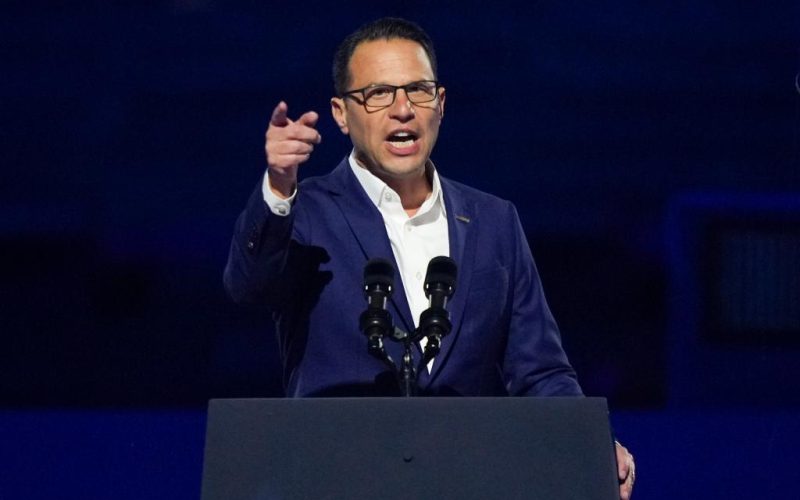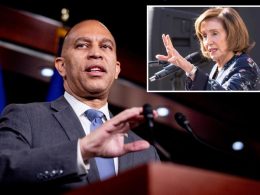Elections often tell you less about the winners than the losers. Victory has many fathers, as the saying goes, but defeat shows you exactly what went wrong.
Pennsylvania’s 2024 results offer a master class in Democratic collapse: while Trump edged out Kamala Harris by 2 points in the presidential race, Republicans romped to victory in every down-ballot statewide contest.
Dave McCormick pulled out a narrow victory over three-term Senator Bob Casey; Dave Sunday trounced Eugene DePasquale by 5 points in the attorney general race; and incumbent Tim DeFoor beat Malcolm Kenyatta by an even wider margin for auditor general.
The story of how Democrats fumbled Pennsylvania reveals itself in the campaign’s final weeks. Trump’s operation blanketed working-class neighborhoods with simple, direct messaging: “Trump: Safe Borders/Kamala: Open Borders,” “Trump: Low Inflation/Harris: High Inflation.”
His team’s “Kamala is for they/them” ad sparked legal threats but achieved its intended effect — the Democrats are worried about boutique issues rather than kitchen-table concerns like inflation. Harris, meanwhile, released a series of slickly-produced but culturally tone-deaf ads attempting to portray Pennsylvania working-class life.
Harris’s response proved telling. Her team launched what they considered their October surprise: a series of joint appearances with unpopular former Republican Liz Cheney focused on “saving democracy.” The rallies, held primarily in affluent suburban enclaves, epitomized the campaign’s fundamental misread of the state’s political geography.
Her campaign’s last notable attempt at working-class authenticity — a commercial featuring a supposed working-class local who seemed like an actor delivering focus-grouped lines about Trump being a “little silver spoon boy” — landed with my working-class relatives about as well as vegan bulgogi tacos at a union hall.
This messaging disconnect infected every Democratic campaign. DePasquale, running for attorney general, leaned heavily on his record as a fiscal watchdog and government reformer — but not as a prosecutor, because he never was one. A compelling pitch in theory, but it withered against career prosecutor Sunday’s relentless focus on fentanyl seizures and declining crime rates in York County. While DePasquale talked process and oversight, Sunday’s team plastered social media with bodycam footage of drug busts and arrests.
Kenyatta’s auditor general campaign highlighted the party’s deeper problems. The 34-year-old progressive rising star, known mainly for viral speeches and an unsuccessful Senate bid, campaigned on transforming the office into a vehicle for social change — which made sense when one realized he had no experience in the role. Against incumbent DeFoor’s straightforward non-partisan message about cutting waste and protecting taxpayers, Kenyatta’s ambitious agenda read like a DEI solution in search of a problem.

Even Casey, who built his career on careful moderation and labor support, couldn’t find enough votes to secure a fourth term in office. After decades positioning himself as a blue-collar, Blue-Dog Democrat, Casey’s recent selective embrace of progressive causes provided perfect fodder for McCormick’s advertising team.
While Republican ads hammered Casey’s voting record and association with flip-flopping presidential candidate Harris, his campaign responded with a barrage of increasingly desperate fundraising emails, each one predicting imminent doom. The horrendously off-key messaging — subject lines included “To avoid a catastrophe” and “The worst news yet” — became a self-fulfilling prophecy. Who wants to vote for a loser?
The results expose the bankruptcy of Democrats’ coalition-building strategy. Harris’s team believed they could unite urban progressives and anti-Trump suburbanites while holding just enough working-class voters through careful messaging and strategic positioning. Instead, they achieved a rare political feat: speaking convincingly to absolutely no one.
Gov. Josh Shapiro, floated as Harris’s potential running mate, embodied these contradictions. His “Get Sh*t Done” gubernatorial slogan had promised pragmatic results but delivered historic inaction, as the Commonwealth Foundation has reported — just 111 bills signed in 18 months, the fewest of any Pennsylvania governor in 50 years. For comparison, Virginia’s Glenn Youngkin pushed through 1,654 bills in the same period with a part-time (and divided) legislature.
The implications stretch beyond a single election cycle. Despite its slowly-dwindling population, Pennsylvania’s 19 electoral votes and competitive Senate seats make it essential to any future Democratic coalition.
Yet Tuesday’s results suggest the party has lost its ability to communicate effectively with voters outside Philadelphia and Pittsburgh. The state office margins — larger than the presidential gap – indicate problems deeper than any individual candidate’s shortcomings.
Much as they have since 2016, Democrats continued to try to thread an impossible needle: mollifying progressives with substance-free identity politics while also wooing suburban Republicans and maintaining their working-class base in the absence of genuine working-class policy proposals.
The result was messaging so carefully calibrated it became meaningless, every bit as insubstantial as Kamala Harris’ final cameo appearance on SNL.
Unless and until Democrats can craft a message that resonates beyond their urban strongholds — and find experienced, competent candidates capable of delivering said message without sounding like McKinsey consultants explaining steel manufacturing to career steelworkers — Tuesday’s results may augur a permanent realignment in a state they once considered to be winnable.
Here in the Keystone State, as elsewhere in the country, the party’s obsession with building the perfect coalition has left them with hardly any coalition at all.
Oliver Bateman is a historian and journalist based in Pittsburgh. He blogs, vlogs, and podcasts at his Substack, Oliver Bateman Does the Work.
Reprinted with permission from RealClearPennsylvania.








